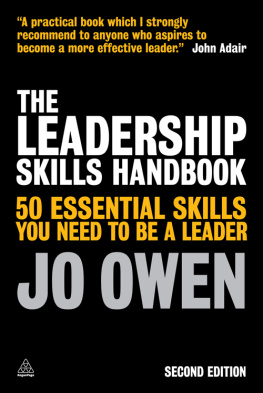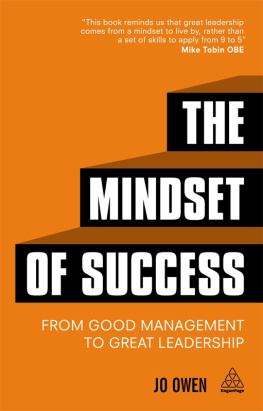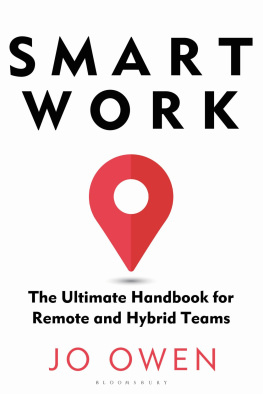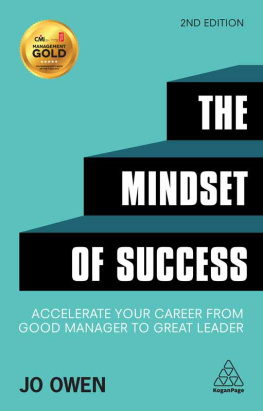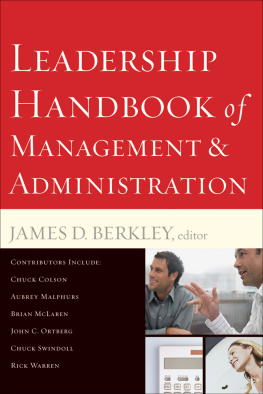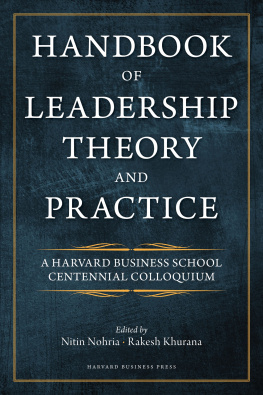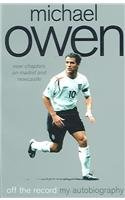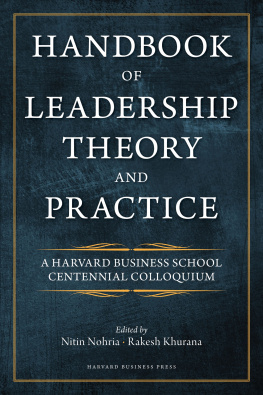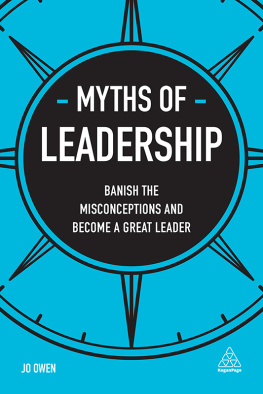Jo Owen - The Leadership Skills Handbook
Here you can read online Jo Owen - The Leadership Skills Handbook full text of the book (entire story) in english for free. Download pdf and epub, get meaning, cover and reviews about this ebook. publisher: Kogan Page, genre: Business. Description of the work, (preface) as well as reviews are available. Best literature library LitArk.com created for fans of good reading and offers a wide selection of genres:
Romance novel
Science fiction
Adventure
Detective
Science
History
Home and family
Prose
Art
Politics
Computer
Non-fiction
Religion
Business
Children
Humor
Choose a favorite category and find really read worthwhile books. Enjoy immersion in the world of imagination, feel the emotions of the characters or learn something new for yourself, make an fascinating discovery.
The Leadership Skills Handbook: summary, description and annotation
We offer to read an annotation, description, summary or preface (depends on what the author of the book "The Leadership Skills Handbook" wrote himself). If you haven't found the necessary information about the book — write in the comments, we will try to find it.
The Leadership Skills Handbook — read online for free the complete book (whole text) full work
Below is the text of the book, divided by pages. System saving the place of the last page read, allows you to conveniently read the book "The Leadership Skills Handbook" online for free, without having to search again every time where you left off. Put a bookmark, and you can go to the page where you finished reading at any time.
Font size:
Interval:
Bookmark:
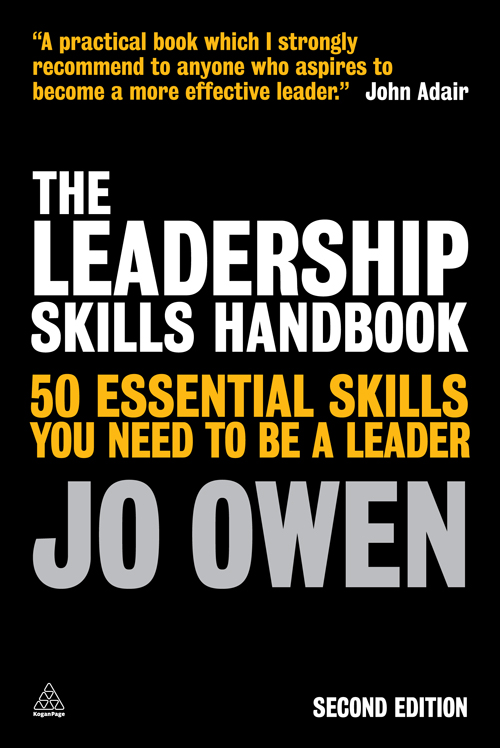

Note on the Ebook Edition For an optimal reading experience, please view large |
This ebook published in 2012 by
Kogan Page Limited
120 Pentonville Road
London N1 9JN
UK
www.koganpage.com
Jo Owen, 2006, 2012
E-ISBN 978 0 7494 6478 3
Contents
04 Coaching
05 Listening
05 Learning to be lucky
Acknowledgements
T his book reflects the collective knowledge, wisdom and experience of thousands of leaders who have contributed through surveys, interviews and real experience . I am especially grateful to the outstanding leaders of the future at Teach First who have effectively tested and challenged many of the ideas in this book . Our future is in good hands when they do emerge as our leaders.
Monitor Group kindly provided some of the initial research that provoked the new thinking and insights behind this book.
I would not have written the book without the encouragement of Jon Finch at Kogan Page . Professor Nigel Nicholson at London Business School generously gave time, insight and hospitality; Dr Nick Baylis at Cambridge University has opened up whole new vistas on leadership through his positive psychology work; Francis Gouillart and Professor Venkat Ramaswamy at Michigan Business School have also opened new doors through their co-creation work . The staff at Teach First have quietly worked wonders on some of my leadership efforts.
The faults in this book are all mine: I could not have wished for better support and insight from such a wonderful group of people.
Most importantly, I would like to thank those many organizations for whic h I have worked across the world . There is no substitute for seeing leadership in action: it is never as simple as it looks in books . So my thanks go to:
ABN Amro | Aviva |
Accenture | Barclays Bank |
AEGON | BT |
Airbus | Cap Gemini |
ALICO | Central Bank of Indonesia |
American Express | Chase Group |
Apple Computers | Citigroup |
Armstrong Industries | Crown Prosecution Service |
Edexcel | Procter & Gamble |
EDS | Qualcomm |
Future Leaders | RBS |
Gemini | Rentokil |
Hallmark Cards | RHM |
HBOS | Royal Sun Alliance |
HCA | SABIC |
IBM | San Miguel |
ItoChu | SDP |
Lloyds Bank | Skype |
Merrill Lynch | Start Up |
MetLife | SWIFT |
Mitsubishi Chemicals | Symantec |
Monsanto | Teach First |
National Air Traffic Services | Teaching Leaders |
NCB | Thorn Rental |
NHS | UBS |
Nordea Bank | Unilever |
Norwegian Dairy Association | Union Carbide |
Philips | Zurich Financial Services |
Introduction
M ost leadership books try to answer the question What is good leadership? That is like trying to answer the question What are people like? The resulting debate generates more heat than light because leaders, like people, come in many different shapes and sizes.
This handbook is different. It starts with the question: How can you learn to lead? In our research with over 1,000 leaders at all levels in public, private and voluntary sectors the answer was clear: leaders learn not from courses but from experience, bosses, peers and role models. Some of the lessons are positive: we try to copy effective behaviour. Some lessons are negative: we see a boss or peer explode spectacularly and quietly decide not to copy that mistake.
The problem with learning from experience is that it is a random walk. Bump into good role models and experiences and you learn good lessons. Get the wrong role models and experience and you learn the wrong lessons. Not many people become leaders through the luck of the random walk.
This handbook will help you take the randomness out of the random walk of experience. It gives you a framework for observing and learning from the experiences you go through. The structure takes some of the randomness out of random experience and lets you learn faster and better than your peers: this is your guide to accelerated leadership.
Our research identified the main practical skills that leaders must have. No leader gets ticks in all the boxes. But you need to develop some signature strengths and you do not want to fail badly in any area.
The book does not prescribe a single formula for success. You will not have to become Nelson Mandela, Genghis Khan or Mother Teresa to succeed. The book allows you to create your own formula for success. Your success formula will reflect a combination of what works in your sector, organization and profession plus what works for you as an individual.

The leadership riddle
There are two dead-end roads to leadership. The first dead end is to try to be someone else. We cannot be Churchill, Gandhi and Alexander the Great all rolled into one (although there are some people who think they are already that good). We have to be true to ourselves.
The other dead end is to simply be who we are, in the vain hope that the world will recognize our innate brilliance and leadership talent. We could end up waiting a very long time.
So now we have a problem: we cannot become leaders by being someone else, and we cannot succeed by being who we are. How do we solve this riddle?
The solution is that we have to become the best of who we are. This book is your guide to discovering how to be the best of who you are. It will help you discover, build and celebrate your strengths. You will not have to sacrifice your personality: you can be a leader on your own terms, not on the terms of some guru with a great theory.

This handbook helps you take the randomness out of the journey to leadership. The book features the core skills leaders need to develop. Each skill has a framework to help you think about how that skill should be deployed ideally. As important, note and learn from your own experience examples of where you see the skill being deployed well or less well. You should think hard about why it was effective or less effective. As you observe and record real-life examples of skills in action, you will be developing your own unique formula for success in your own unique context.
This handbook is to be used by you to create your own leadership DNA. Ideal leadership is always inferior to practical leadership: what works for you where you are. The handbook only succeeds if you use it as an active tool. When you are faced with an unfamiliar challenge, refer back to this handbook and your notes. Use the book well and it can become your personal guide and coach on the road to leadership.
Next pageFont size:
Interval:
Bookmark:
Similar books «The Leadership Skills Handbook»
Look at similar books to The Leadership Skills Handbook. We have selected literature similar in name and meaning in the hope of providing readers with more options to find new, interesting, not yet read works.
Discussion, reviews of the book The Leadership Skills Handbook and just readers' own opinions. Leave your comments, write what you think about the work, its meaning or the main characters. Specify what exactly you liked and what you didn't like, and why you think so.

